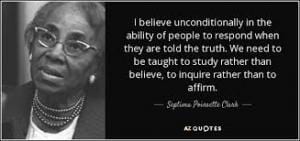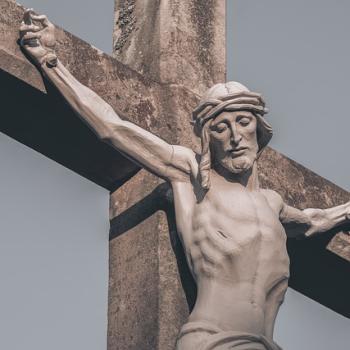
Common Prayer for Ordinary Radicals, in its May 3 entry, tells about one who was teacher, civil rights activist, and “grandmother of the civil rights movement.” I’m continuing my “Ordinary Radicals” series with Septima Poinsette Clark. Biography.com, Stanford’s King Institute, State University, and Wikipedia are my other sources.
Septima Poinsette was born in Charleston, South Carolina in 1898. Her father, Peter Poinsette, had been a slave on the Poinsette farm. As house servant, he took children to and from school. After slavery he worked on a ship and met Septima’s motherin Haiti during one of his ship’s travels. Victoria Warren Anderson had been born in Charleston but moved with her brother and two sisters to Haiti in 1864. She vowed never to be anyone’s servant. (Wikipedia) All the sources agree on this timetable for Septima’s parents. It makes them pretty old when Septima was born in 1898, and they had six more children! (Biography.com)
Early trials and activism
Back in segregated Charleston, Septima’s family struggled to get her an education. She graduated from secondary school in 1916 with the desire to be a teacher. Charleston did not hire black teachers, so she taught in a black school on St. John’s Island off the Carolina coast. There she experienced the inequality of separate systems for blacks and whites (State University):
- Expenditure per student — $17.02 for whites; $1.90 for blacks.
- Teacher salaries — $85 per month for whites; $35 per month for Clark
- Class size – no more than 18 for whites; over 60 for blacks
By 1928 Septima was advocating for equal pay for black and white teachers. It wasn’t until 1945 that she succeeded, working on a case with Thurgood Marshall and the NAACP. Her salary tripled when they won their case. ((Biography.com)
Education in politics
In the 1950’s Septima started conducting summer workshops at Highlander Folk School, Monteagle, Tennessee. This grassroots education center focused on social justice. Rosa Parks was one of her students a few months before the famous protest that started the Montgomery bus boycott. In 1954 the Supreme Court issued its Brown vs. Board of Education ruling that “separate but equal” was both unequal and illegal. In 1956 South Carolina prohibited city and state employees from belonging to civil rights organizations. Septima Clark had been teaching for 40 years but lost her job because she refused to resign from the NAACP.
Highlander hired Septima fulltime, and she continued her work of making education a powerful political tool. At a time when literacy tests prevented poor people from voting, she taught basic literacy skills and how to fill out voter registration forms. She emphasized the rights and duties of U.S. citizens. The state of Tennessee closed Highlander in 1961, and the Southern Christian Leadership Conference took up the education cause. Septima became director of its Citizenship Education Program modeled on her own workshops. (King Institute) The program reached eleven states in the South. (State University)
The State University article comments:
As an educator within an oppressive Jim Crow system, Clark’s understanding of the connections among illiteracy, poverty, and power allowed her to link social reform and educational advancement. These were issues she spent her entire life addressing both as a teacher and a private citizen.
Retirement and recognition
Septima retired from the SCLC in 1970 but continued conducting workshops. Voters of the city of Charleston elected her to the city school board in 1975. In 1976 South Carolina’s governor reinstated her teacher’s pension, which the state had denied her when firing her back in 1956.
President Jimmy Carter gave her a Living Legacy Award in 1979. (King Institute) She also received the Order of the Palmetto, South Carolina’s highest civilian honor, in 1982. She published two autobiographies. The second, Ready from Within: Septima Clark and Civil Rights, won an American Book Award. (Biography.com)
Common Prayer for Ordinary Radicals says:
Although Septima was thrown in jail, threatened, fired from jobs, and falsely accused of wrongdoing, she never turned from her task of working against an unjust educational system.
Septima Clark died at age 89 December 15, 1987. A school in Washington, D.C., a parkway and a park in Charleston, and a minor planet in the solar system are named for her. (Wikipedia)
Image credit: Pinterest
















